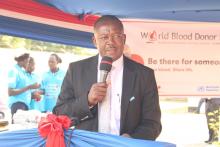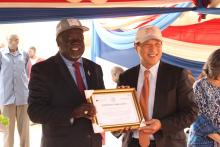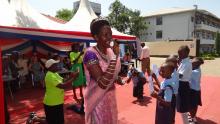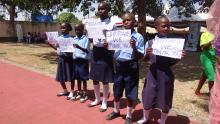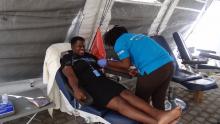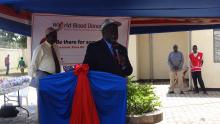World Blood Donor Day: South Sudan registers more voluntary unpaid blood donors
Juba 15 June, 2018 – ‘I have witnessed it myself that most of our mothers die due to losing a lot of blood after delivery and about 80 percent die because of lack of blood for transfusion. So, I felt that I should act as an example to donate blood to save the lives of our mothers’ said Judith a midwife working at Juba Teaching Hospital after donating blood. She appealed to other health workers to volunteer and donate blood to save more lives.
South Sudan joined the rest of the world to commemorate the World Blood donor day on 14 June under the theme ‘Be there for someone else. Give blood. Share life’. The country has made progress in building capacity and increasing acceptance of voluntary unpaid blood donation. Although this has improved availability of safe blood, the demand for blood still far exceeds the supply countrywide. To demonstrate the commitment of the people of South Sudan through voluntary unpaid donations, more than 86 units of blood were collected in Juba on World Blood Donor Day alone.
With funding from the Government of Japan, WHO supported the Ministry of Health to establish two Regional blood transfusion centers in Juba and Wau respectively. The National Blood Transfusion Services (NBTS) in South Sudan is also being strengthened especially recruitment and retention of voluntary unpaid blood donors, capacity building to increase blood donation; laboratory testing, processing and screening of blood; appropriate clinical use of blood and blood products, and improve availability of safe blood to more hospitals in the country.
‘Blood is thicker than water’. This according to H.E. Seiji Okada, Ambassador of Japan to South Sudan is a symbol of the unity among human beings. ‘Instead of donating blood from Japan to the people of South Sudan, the people of Japan will harness their strong relationship through continued support to the Ministry of Health to improve blood transfusion services in the country’.
The Hon Minister of Health, Dr Riek Gai Kok reflected on the December 2013 crisis when the country needed a lot of blood and Kenya came to the rescue with 90 pints of blood. ‘Today we came to celebrate the partnerships which have contributed to the development of the National Blood program, and the blood donors for their life saving gifts of blood’. The Minister also appreciated the Government of Japan, WHO and other partners who generously funded the Blood Transfusion Services in this country, with equipment and technical support.
The WHO Representative a.i. for South Sudan Mr Evans Liyosi, who is also a regular blood donor appreciated the leadership of the Hon. Minister for Health, Dr Riek Gai Kok, in mobilizing partnerships to promote the spirit of giving blood as well as negotiating for facilities for blood transfusion services. He restated WHO’s commitment to continue providing technical support to the Ministry of Health to implement the National Blood Policy and Strategic plan, normative guidelines and standards, and more importantly scaling and rolling out the blood transfusion services beyond Juba or Jubek State.
Others who made good will remarks included Mr John Lobor, Secretary General of the South Sudan Red Cross who emphasized the role of the Red Cross in community mobilization.
Tel : +211 956 991 637
Email : chitsvaja [at] who.int
Communication Officer (Health Promotion/Risk Communication focal person)
Mobile: +211 (0) 921647860
Email: luwagal [at] who.int
Tel: +211 (0)959 003152
Email : takanobu.nakahara [at] mofa.go.jp




